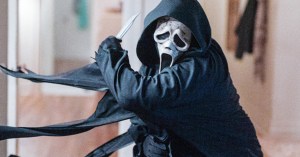A Girls Finale Truth: The Girls Were All Terrible
Did Hannah, Marnie, Jessa, and Shoshanna grow up as the HBO comedy came to an end?

In the series premiere of Girls, Lena Dunham‘s Hannah Horvath claimed to be the voice of her generation. It was the type of self-centered declaration only an idealistic, fresh-out-of-college twentysomething could make. It’s also the type of completely self-unaware declaration typical of Hannah — a character that has inspired some love but plenty of hate since her introduction.
While the years have clouded the public opinion of Girls, critics loved the first season for its portrayal of “real female friendships, the angst of emerging adulthood, nuanced relationships, sexuality, self-esteem, body image, intimacy in a tech-savvy world that promotes distance, the bloodlust of surviving New York on very little money and the modern parenting of entitled children, among many other things—all laced together with humor and poignancy,” wrote Tim Goodman of The Hollywood Reporter.
But at some point over the ensuing five seasons, a mention of Girls became associated with an eye roll rather than an excited “me too.” Nobody’s comparing themselves to a Hannah, Marnie (Allison Williams), Jessa (Jemima Kirke), or Shoshanna (Zosia Mamet) anymore like they’d identify with a Sex and the City character. A more likely response: “Ugh, they’re all terrible.”
And there’s a reason for that — it’s because of that real-ness critics raved about in season 1. Yes, the Girls really are kind of terrible — because in reality, we’re all kind of terrible sometimes, we’re just not used to seeing our worst moments play out onscreen.
In honor of the series finale, which saw Hannah enter a new stage of life as a mother — a job that requires humility and putting the interests of others ahead of your own — here’s an accounting of the horrible-ness of each Girl, and how she might or might not have redeemed herself by the end of the series.
SPOILER WARNING: STOP HERE IF YOU HAVEN’T SEEN THE GIRLS SERIES FINALE

Hannah (Lena Dunham)
Why She’s Terrible: The aforementioned “voice of my generation” statement, plus plenty of other similar declarations. First season Hannah (and subsequent seasons, too) was confident to the point of arrogance, and, most of all, so incredibly self-centered and selfish that she didn’t think of anyone other than herself. Ever.
Redemption: In the last two seasons of Girls, especially, Hannah began to acknowledge that other people might have feelings and opinions, too. A major turning point: Even though she (and everyone else) thought marrying Desi was a horrible idea for Marnie, she kept her opinion to herself. It was a lesson her friend needed to learn on her own, and Hannah acknowledging that fact was a huge step forward. Sure, she did plenty of other crappy things that season, especially to her boyfriend Fran (Jake Lacy), but it marked the beginning of Hannah’s true transition to adulthood.
In the sixth season, Hannah’s decision to keep her baby was surprising, but also not — she felt like she was entering a new stage of her life and could handle what life threw at her. The penultimate episode saw Hannah optimistic about her new future, but in the finale, Hannah realized that motherhood wasn’t exactly as she expected it would be.
In true Hannah fashion, though, she didn’t snap out of it because of the advice her mother gave her — she had to learn it on her own when she encountered a teenage girl running away from something in distress. But instead of an assault or something serious, the girl was running from her mom telling her to do her homework. Totally ridiculous and dramatic and exactly what Hannah was doing at that moment.
When she got home from her journey, she went upstairs and promptly began to breast feed her son, Grover. No, she didn’t apologize to her mother or Marnie, who was there helping her, but she was back on track.

Marnie (Allison Williams)
Why She’s Terrible: Unlike Hannah’s in-your-face confidence, Marnie is insecure to a fascinating degree. Every move she makes is motivated by how it’ll look to others — not how it’ll work for her. See: Everything from her embarrassing music video to her ill-advised marriage to her music partner. Plus, she was as selfish as Hannah, she just wanted people to think she was a good person. She was a do-gooder whose good deeds were all about how great she’d look for doing them.
Redemption: One of the most important lessons of your twenties is learning what you don’t want, and as Marnie stumbled through relationships and career paths, she was able to realize what she didn’t want out of life. And while she was the sentimental one who wanted to keep the group in tact, her actions — not really talking to Hannah in her time of need, among other things — proved otherwise. Maybe what Marnie needed the most was to let go (of control, of the past, of her ideas of the future).
Then again, Marnie is also very loyal, so despite the fact that her reasons for wanting to help Hannah with her new baby (“I win at being your best friend,” she exclaimed when Hannah agreed), she really did it. But after a talk with Hannah’s mother, she realized that she needed to pursue her own happiness instead of catering to others’ — she just needs to figure out what that entails.

Jessa (Jemima Kirke)
Why She’s Terrible: Jessa was a selfish, impulsive addict who makes big life decisions on a whim and can’t really be relied on for much — well, other than a good time. And just when she started to turn her life around, she went and fell in love with her friend’s ex — not just any ex, either, the most important relationship her supposed BFF had in her adult life.
Redemption: Getting sober and actually wanting to stay sober was truly meaningful for Jessa. And falling in love with Adam (Adam Driver) was part of that process, as horrible as it was to do that to Hannah. But in apologizing to Hannah, Jessa was also able to both acknowledge the importance of her betrayal and the regret she had because of it. Season 1 Jessa didn’t have regrets about anything.

Shoshanna (Zosia Mamet)
Why She’s Terrible: The annoying little sister of the friend group, Shosh was self-unaware in a very different way from Hannah, insecure in a way not unlike Marnie, and she talked REALLY fast. Yes, she was annoying.
Redemption: Shosh was also always the smartest member of the group (no matter how intellectual Hannah fancied herself), and after losing her way after losing her job in Japan, she found direction, a hot new fiance, and the courage to acknowledge that not only had the group of girls grown apart, that they may not have been true friends in the first place.

Adam (Adam Driver)
Why He’s Terrible: Don’t think the awfulness was limited to the girls. Adam treated Hannah horribly throughout most of their relationship, and then dated her best friend.
Redemption: Over the years, Adam learned how to better treat the women he dated, and found a career path that allowed him a creative outlet. Plus, becoming an uncle and caring for his flighty sister’s child instilled responsibility into him as well. Of course, leaving Jessa and offering to raise Hannah’s baby wasn’t really great, either, but it was well-meaning.

Ray (Alex Karpovsky)
Why He’s Terrible: Ray was a grumpy, lonely young man in an old man’s body who barely tolerated being around the Girls.
Redemption: His redemption came much earlier in the series than the rest of the characters, as he softened his hard edges and fell into relationships with Shoshanna and Marnie. But while those women both wanted to change him, ultimately, Ray ended the series pursuing a relationship with Abigail (Aidy Bryant), who loved his quirks and actually shared many of his passions.

Elijah (Andrew Rannells)
Why He’s Terrible: Hannah’s ex-boyfriend-turned-gay-BFF-turned-roommate was the person she turned to for gossip and smack-talking, and his similar career paralysis didn’t really provide motivation for either of them. As much as they comforted each other, they could also be toxic for each other as well.
Redemption: Perhaps seeing Hannah’s writing career (improbably) take off inspired Elijah to do some thinking of his own, because he finally got off the couch and started auditioning for Broadway shows again. And getting callbacks helped him remember that he was a good performer after all — but would never succeed if he didn’t work at it.
[socialpoll id=”2435169″]
What did you think of the Girls finale? Share your thoughts in the comments!







